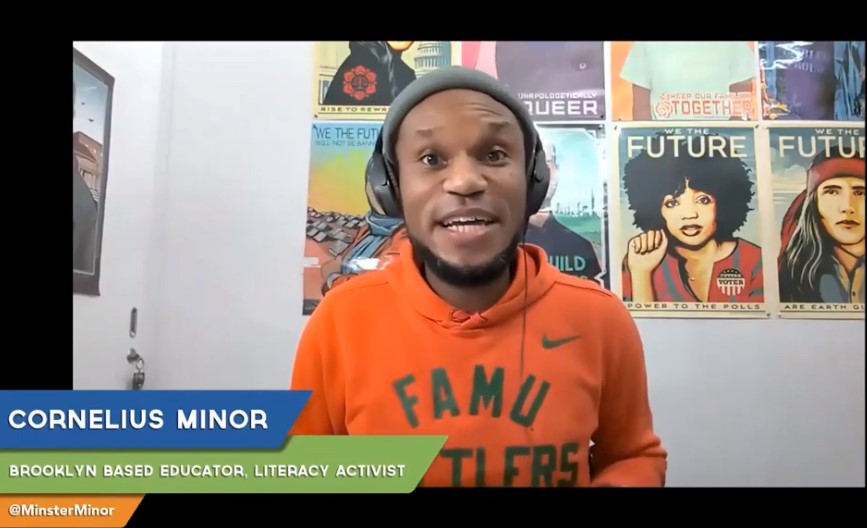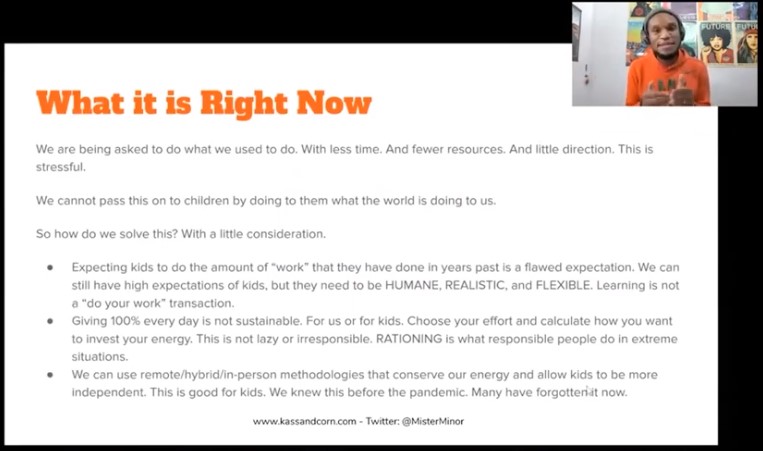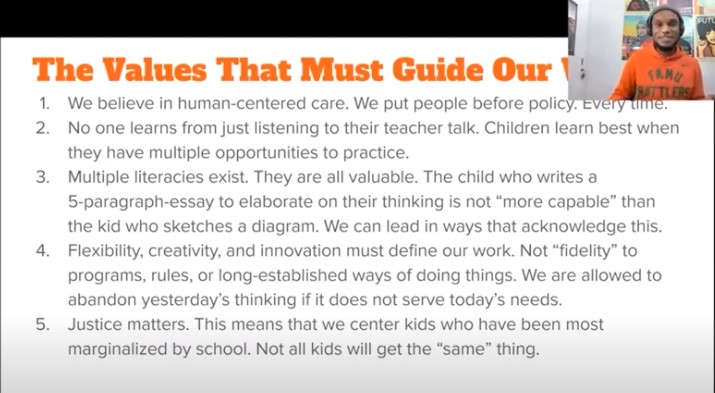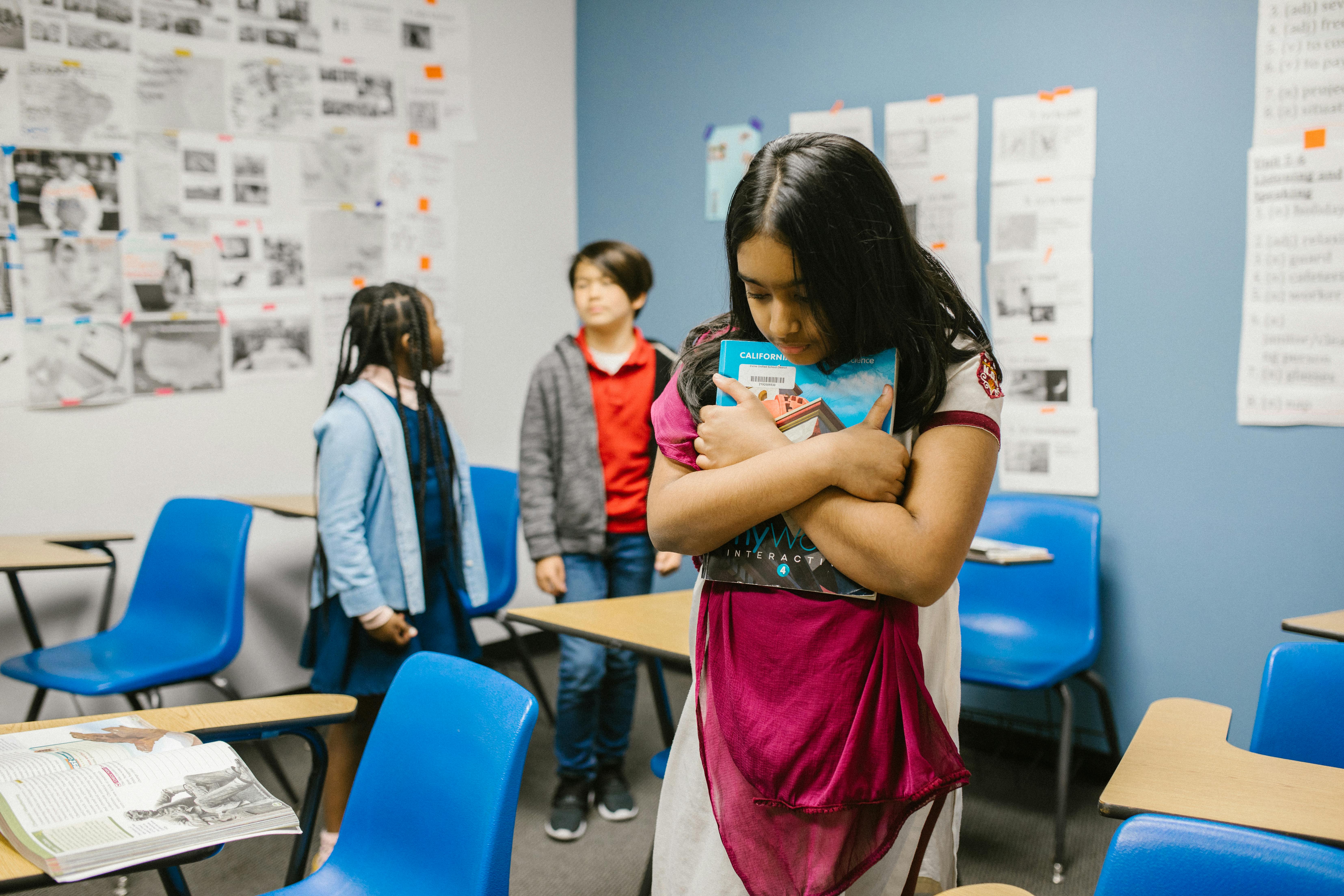Rather than Back to ‘Normal,’ Let’s Get Back to Something Better
Passionate educator Cornelius Minor challenges his New York City colleagues to create a more inclusive and engaged learning environment

Tools and ideas to transform education. Sign up below.
You are now subscribed
Your newsletter sign-up was successful
As we grapple with pandemic fatigue, we hear a lot about “getting back to normal” and longing for the “before times.” However, Cornelius Minor does not feel nostalgia for life pre-March 2020.
“The normal we left behind was a normal that left far too many kids at the margins,” said the Brooklyn-based educator while sharing his philosophies and teaching strategies with fellow New York City educators at the recent virtual 2020 NYC DOE Beyond Access Forum.
Though educators have long been aware of the equity gap that persists in U.S. schools, the scope of the problem has been better exposed to the public as a result of the schools shifting to remote learning. “Remote and hybrid learning has revealed to many what educators representing historically marginalized groups have been articulating for years, and that is the reality that there are profound inequities in schooling,” said Minor.
“We are working through the greatest period of professional uncertainty in the last decade, and what we are attempting to do right now has never been done before,” he continued, affirming support for educators. He suggested that there is more than one way forward, and that educators have to increase their systemic awareness and understanding of the multiple challenges and systems of oppression that exist outside of school, and how those things make their way into classrooms.
“We have to grow our capacity to actually build the change,” Minor said. “We don’t have to continue doing as we’ve always done. Embracing discomfort is necessary. Justice matters.”
What to Preserve in Remote, Hybrid, Socially Distanced Learning

Much of classroom practice has been upended by the pandemic, but Minor believes there are essential relationships from the classroom that need to be encouraged and preserved in remote learning. For example, it is twice as likely that students learn from peers than the teacher. So, educators need to find ways to foster and maintain the authentic connections students have with one another. Minor also advocates that skill acquisition is more important right now than content acquisition—that skills can transfer from one academic context to another.
“It’s not our job to keep students busy,” said Minor. “It’s our job to keep them curious as we figure out what it means to move forward.”
Tools and ideas to transform education. Sign up below.
How to Create a New Kind of School
Minor is adamant that students will opt into learning if they are curious, and is working to keep them engaged with activities that are creative. He posed a self-reflection question to the attendees: “Think about the values that guide your work as an educator. In these last seven months, what have you discovered about yourself, your students, your school, your community, the country and the world?”
Challenging educators to think about education in new ways, Minor suggested that schools would:
- Allow students to learn in ways that work for them
- Affirm students as learners and people
- Grow students powerfully by providing access to rich opportunities in class and beyond
- Keep students intellectually, emotionally, and physically safe
“What gets in the way when not every kid has access to those things?” Minor asked. He believes that too often, we value compliance over learning; assignments over learning outcomes. “Access is a bridge,” he said. “We know that learning outcomes, especially right now, matter more than assignments.”

Sharing his own self-examination, Minor said, “If I want the kind of access we all profess to value for all children, then I’ve got to be ready and willing to look at my own classroom, in my own department, in my own school, and ask myself some really tough questions.”
“I want to dig beneath the surface to see what our kids are left out of, and once I name that thing, I get to reimagine that thing in order to give people more access,” he said. “But the key here is to fix the injustice, not the kids.”
His conclusion? “I had to reimagine what it means to engage in remote learning. And, so I created different options for engagement,” he said.
Students are not naturally disengaged, Minor said, taking up the challenge to develop ways to pull in students for learning. He acknowledged that access is a problem for other reasons than lack of technology. For example, some students are taking care of younger siblings while their parents work outside the home.
Minor shared some of his expanded options for student engagement:
- Allow students to attend a live class OR watch on video
- Let students send in a photo of themselves working independently or with a friend
- Work directly with individual students to reach learning outcomes
- Create an online space so kids can talk to each other about a non-school topic, such as the NBA finals, hip-hop, rock, or reggae
- Host an online support group for students taking care of younger siblings
- Hold regular story times for younger students
Minor closed his presentation with his belief that returning to “normal” was not an option--it left far too many students behind.
“We can use the power of our imagination and the power of our active labor in classrooms and in community to craft something that is radically better than that which we left behind,” Minor said.
More on Cornelius Minor’s work can be found here
Annie Galvin Teich has more than 25 years' experience in education writing and publishing. She is an edtech industry expert in content marketing and copywriting. As a regular contributor to Tech & Learning she focuses on the information needs of district decision makers.
